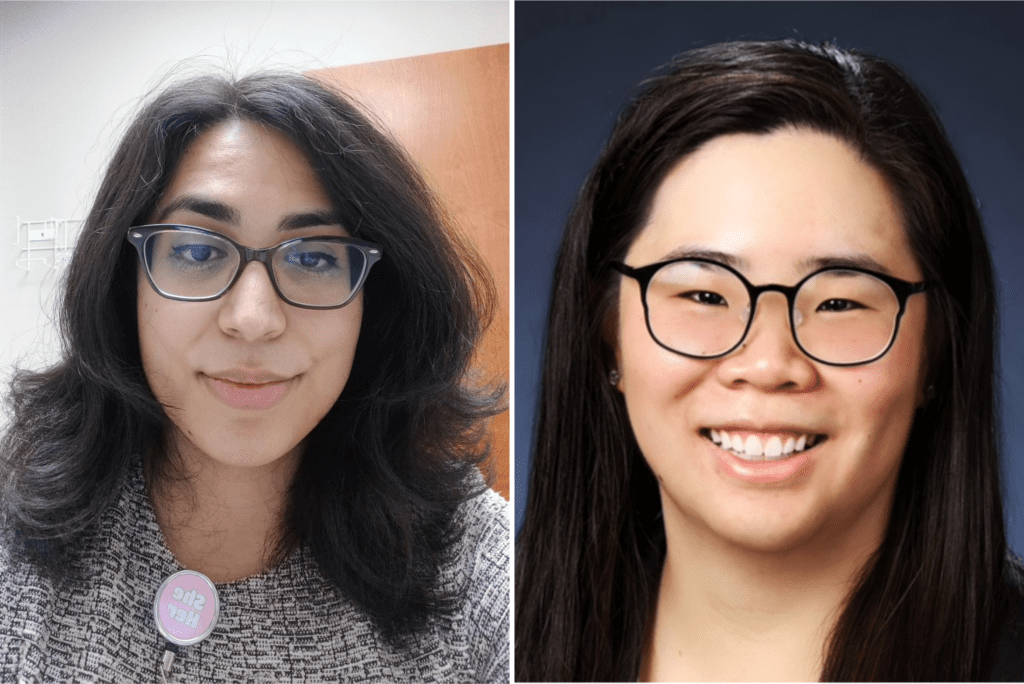
A transgender resident and a medical student who chose homelessness to save money for her education shared their stories of courage and challenging societal stigmas as part of the College of Medicine’s Diversity Week celebrations.
“Their stories remind us that the best doctors are humans who can relate to others, who have overcome their own personal adversity and who bring a unique lens and perspective to patient care,” Dr. Tracy MacIntosh, associate dean for diversity equity and inclusion. The Oct. 21 presentations were part of the Human Library Project, which invites medical school faculty, staff and students to share their unique life stories as a way to build a more inclusive community.
Second-year psychiatry resident Dr. Gabriella Meyerson identifies as a transgender woman and began transitioning during medical school. She described her journey to become a doctor while transitioning to womanhood and dealing with the world’s reaction to that transition.
“Getting misgendered is like getting disrespected. It is like taking your humanity away,” she said. “That’s the best way I can describe it. I tried desperately not to ever have that feeling, so I would practice my voice and practice doing my makeup better.”
“I’m vocal because I want to be a role model and a mentor for someone else on this journey. I didn’t have that while growing up. My best advice to anyone struggling would be don’t accept the box that you get pushed in to. Seize the opportunity to be who you are. And surround yourself with people who really cherish that and love you for you.”
Dr. Meyerson said she began questioning her gender expression as a child.
“When I was around eight or nine years-old, I realized that I was different than the rest of the boys,” she said. “I didn’t really have word for it at the time, but I just I had a feeling that I really didn’t quite fit in. As the years progressed, it grew even more apparent, especially during puberty.”
As she got older, she started experimenting with gender expression by wearing tighter clothing, but was ridiculed by classmates. So she decided to suppress her feelings and participate in activities that met masculine expectations.
“When I got to college, I was always trying to be hyper masculine,” she explained. “I got into lifting weights – anything that I thought would help me fit in.”
The stresses of medical school combined with the stress of suppressing her identity caused her to seek the support of a gender therapist who helped her make a plan to start transitioning.
“I took my first dose of hormone replacement therapy on May 31, 2018,” she said tearfully. “That’s a day that will always really resonate for me. It was the first day that I took control of who I am.”
Stigma, choice and courage were themes second year M.D. candidate Terisa Yiin also faced. After attending the University of California Berkeley, Yiin chose to live her in car for several years to save money for medical school.
“I was basically making that choice to live in my car so I could save money for my education for the future,” she said.
She shared her survival methods like getting a gym membership so she could shower, finding public spaces to work and study and safe places to park and sleep overnight, from parking lots to warming shelters for cold California nights.
She also experienced the stigma of homelessness. “I was specifically advised by multiple attendings to not mention the fact that I was homeless for medical school, because of the stigma that comes with that, and because of what it might imply about your resource management and time management,” she said. That was a really harsh truth I had to face.”
Both presenters stressed that medicine and healthcare providers need to better understand and recognize societal biases.
Though she has found a community of support at UCF, Dr. Meyerson says she still faces stigma in some environments and gets nervous about events such as going to the doctor.
“I’m a doctor too and I can still face discrimination, because it’s a challenge we continue to face in the medical field,” she said.
Yiin said her experience underscores the importance of public health and access to care. “I think medicine is changing, but we have a long way to go in terms of how they perceive certain populations,” she said.
“Unlike most persons experiencing homelessness, I had the privilege of having the knowledge and resources to survive without a fixed addressed. Many persons don’t have the knowledge or are just unable to access these resources.”